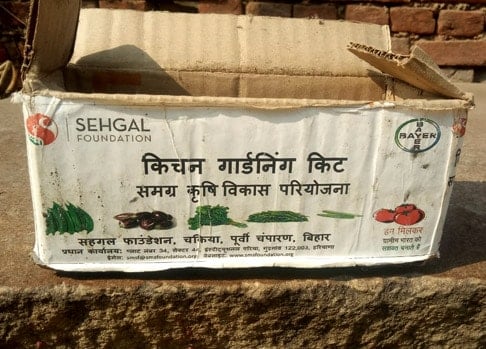Planting the Seeds of Sustainability

Imagine you’re a farmer in rural India, growing rice and vegetables on a small plot of land. In addition to depending on successful harvests for your own livelihood, your crops also help feed other families in your community as well. Like all farmers, you face unpredictable weather brought about by climate change, weeds that compete with your crops for resources, and evolving insects and diseases that target your crops. But you have to address these challenges with limited resources and information to guide your decisions.
This is the reality for many smallholder farmers throughout India—and the world at large. Many aren’t able to access the advanced agricultural practices and technologies that could help protect their crops for more reliable harvests. Without access to regular weather alerts, farmers can’t plan ahead to mitigate or harness changing climate conditions. And without full access to the crop's market, it’s difficult to command fair prices for produce.

This is all too common around the globe. Smallholder farmers provide the majority of the food consumed in developing countries, where much of the population struggles with food security. And many of them have to do it cut off from crucial information that would help them succeed.
That’s why S M Sehgal Foundation works to help rural communities in India create sustainable programs for managing water resources, increasing agricultural productivity, and strengthening rural governance to benefit farmers and their communities.
Sharing a wealth of knowledge
Through its Samagra Krishi (“holistic agriculture”) initiative, the Sehgal Foundation has helped more than 6,000 small and marginal farmers improve their productivity and livelihood. The project has supported more than 25 villages in the Indian state of Bihar by introducing farmers to innovative new solutions for farm mechanization, soil testing, crop diversification, high-tech nursery raising, solar irrigation pumps, and kitchen kit gardens.
One of the most critical aspects of this project seeks to kindle entrepreneurial spirit in farmers to help themselves by working together on projects and sharing the benefits. The program has provided fourteen new solar-powered pumps to help about 4,000 farmers. Farmers have also made great strides by adopting no-till practices, which reduces soil erosion and water loss. Through this program, about 2,000 acres in Bihar are now operating using no-till technology, saving substantial amounts of water, fuel and carbon emissions, while also enabling better weed management. And through the program, the farmers also learn about alternative livelihood options, such as goat rearing, to diversify and enrich their operation.

The Kitchen Garden Initiative included a kit with a variety of vegetable seeds. Farmers received training and a demonstration on preparation, planting, maintenance, and ongoing usage.
Ramakant Kushwaha was one of many farmers in Bihar who struggled just to produce enough food for him and his family. With low-yielding harvests, there wasn’t much left over to sell on the market. Samagra Krishi helped him change all that. The program introduced him to new tools, such as no-till machinery, for a fraction of the cost. In addition to seeing a great efficiency boost on his farm, Kushwaha also got an opportunity to lease equipment out to help other farmers. He reduced his cost of cultivation by more than half and also generated additional income by providing other farmers an opportunity to improve their land use.
While this important initiative has already provided life-changing experiences to many farmers in need, there’s always room to grow. Bayer continues to collaborate with Sehgal Foundation, supporting its efforts to positively impact the Indian farming community. This includes app-based water management, improved weather forecasting, and toll-free helplines to support farmer questions, among many other benefits and opportunities.
Learn more about the Sehgal Foundation’s important work here.









